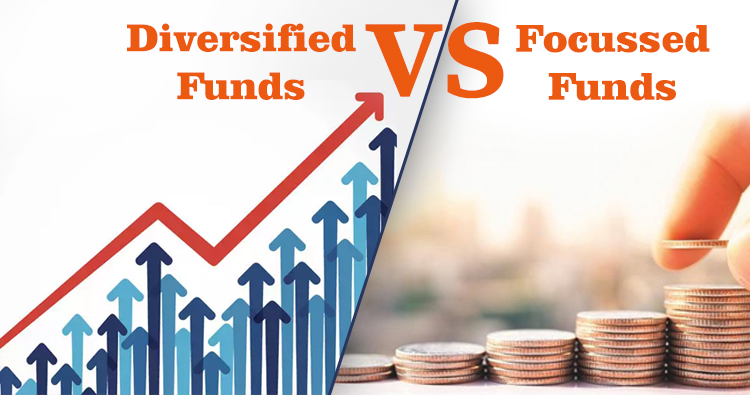


Diversified Funds vs Focussed Funds: Which One Should You Choose?
Fund managers use different investment strategies to manage mutual funds on behalf of their investors. Based on the strategy, fund houses categorise mutual funds into different categories. We can classify equity mutual funds into two different segments: diversified funds and focussed funds.
Both these funds come with their merits and demerits. In this article, we will know about diversified mutual funds and focussed funds and see which one will suit you the best.
What is a Diversified Fund?
If we talk about diversification, especially from an equity fund standpoint, it is the practice of investing across a variety of industries belonging to different sectors.
Diversified Equity Funds invest in stocks of different companies. Diversified fund is an umbrella term that includes large cap funds, small cap funds, multi cap funds etc. Diversified funds do not have any cap on the number of stocks the funds can invest in. Typically, a diversified fund invests around 50 stocks.
As these funds invest in several stocks, the funds come with minimal risk.
Multicap funds that invest in stocks across market capitalisation such as large-cap stocks, mid-cap stocks and small-cap stocks is a perfect example of a diversified fund. Here, the fund manager can increase or decrease the allocation to a category based on the market outlook and reduce overall risk.
Also, as diversified fund doesn’t invest in a particular sector, it protects you from any downturn affecting a particular segment. The gains from other sectors balances the losses.
With risk mitigation, the returns potential of the diversified fund also reduces. As diversified funds invest across various companies, it limits the percentage of allocation of a particular stock in a fund. As a result, the stellar performance of a single or few stocks may not generate attractive returns for the fund.
What is a Focussed Fund?
According to the SEBI’s definition of focussed funds, these funds can invest in a maximum of 30 stocks. The fund can focus in a particular category like large-cap or mid-cap or take a multi cap approach. The aim of these funds is to invest in quality companies for the long-term and deliver higher returns.
As focussed funds invest in a few stocks, the holding of a particular stock is significantly higher than a diversified fund. Hence, any outstanding performance of a stock can lead to higher fund returns.
The higher returns of the fund comes with higher risk. With higher allocation to a single stock, the poor performance of a company can derail the fund’s returns. So, the higher returns of focussed funds come with higher risks.
Also, you need to remember that focussed funds is not the same as sectoral funds. Sectoral/thematic funds invest in a particular sector and with no restrictions on the maximum number of stocks. On the other hand, focussed funds are not restricted to a particular sector, and it caps the maximum number of stocks at 30.
Which one should you choose?
The investment strategy of diversified mutual funds and focussed funds is different. Hence, thesefunds are meant for different investor categories.
If you are new to mutual fund investment or have a small corpus to invest, diversified funds could be a better choice than focused funds. You would be better off by taking a lesserriskto getreturns that are more consistent.
However, if you are a seasoned investor with a large well-diversified investment portfolio, you can look at allocating a small percentage of your portfolio to focussed funds to get higher returns. Moreover, you need to be okay with the fact that your fund manager can get their investment call wrong, which may lead to losses.
Conclusion:
Diversified and focussed mutual funds are two broad categories of equity mutual funds. Diversified funds carry lesser risk than focussed funds. Hence, in general, it is a better option for investors. Also, if you invest in focussed funds, diversified funds should occupy a major part of your portfolio.
Call us to know more and suitable fund for your investment requirement.
Risk Factors – Investments in Mutual Funds are subject to Market Risks. Read all scheme related documents carefully before investing. Mutual Fund Schemes do not assure or guarantee any returns. Past performances of any Mutual Fund Scheme may or may not be sustained in future. There is no guarantee that the investment objective of any suggested scheme shall be achieved. All existing and prospective investors are advised to check and evaluate the Exit loads and other cost structure (TER) applicable at the time of making the investment before finalizing on any investment decision for Mutual Funds schemes. We deal in Regular Plans only for Mutual Fund Schemes and earn a Trailing Commission on client investments. Disclosure For Commission earnings is made to clients at the time of investments. Option of Direct Plan for every Mutual Fund Scheme is available to investors offering advantage of lower expense ratio. We are not entitled to earn any commission on Direct plans. Hence we do not deal in Direct Plans.
AMFI Registered Mutual Fund Distributor – ARN-000 | Date of initial registration – 00 APR 0000 | Current validity of ARN – 00 APR 0000
Grievance Officer- Mr. ABCD | demo@yourdomain.com
Important Links | Disclaimer | Disclosure | Privacy Policy | SID/SAI/KIM | Code of Conduct | SEBI Circulars | AMFI Risk Factors